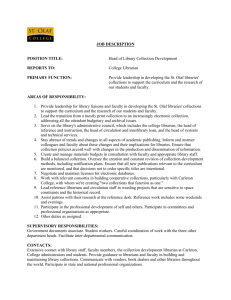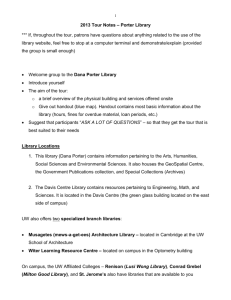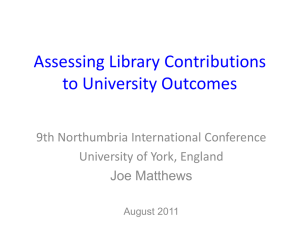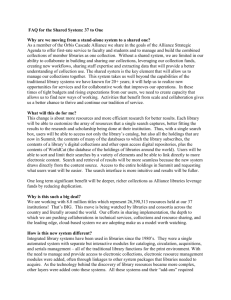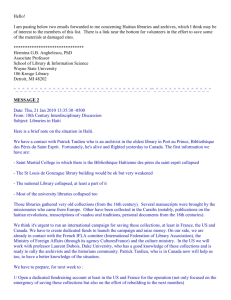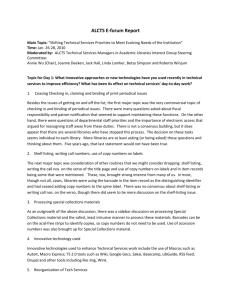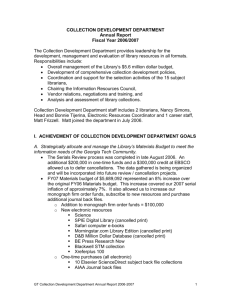Title: Collection Assessment – Best Practices in the 21st Century
advertisement
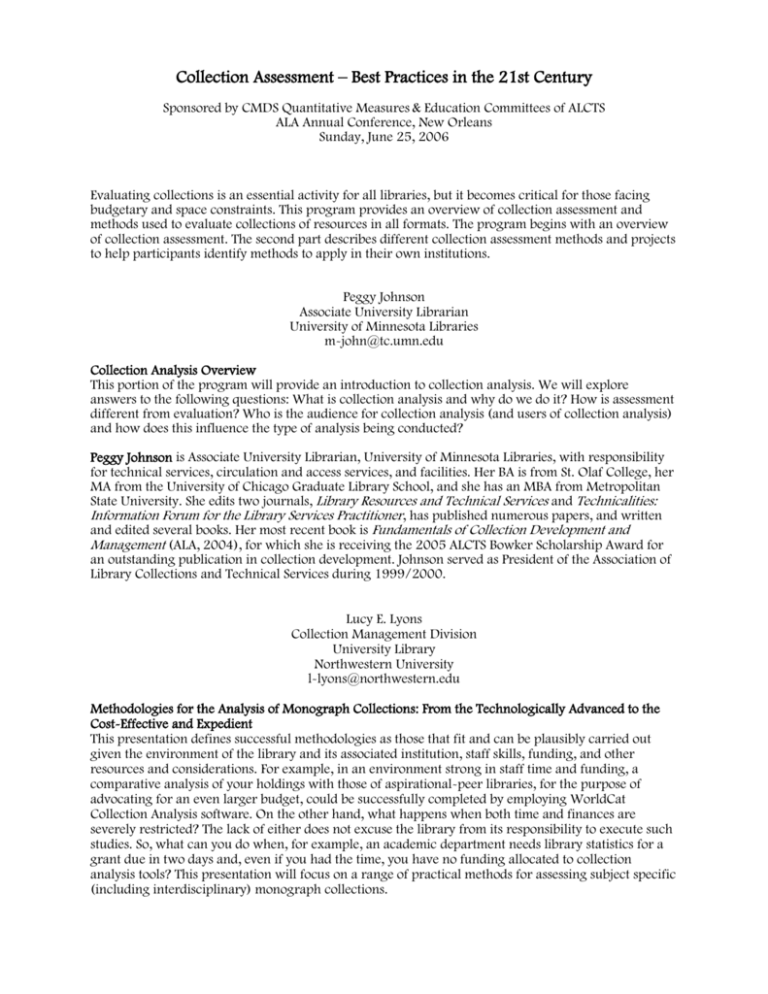
Collection Assessment – Best Practices in the 21st Century Sponsored by CMDS Quantitative Measures & Education Committees of ALCTS ALA Annual Conference, New Orleans Sunday, June 25, 2006 Evaluating collections is an essential activity for all libraries, but it becomes critical for those facing budgetary and space constraints. This program provides an overview of collection assessment and methods used to evaluate collections of resources in all formats. The program begins with an overview of collection assessment. The second part describes different collection assessment methods and projects to help participants identify methods to apply in their own institutions. Peggy Johnson Associate University Librarian University of Minnesota Libraries m-john@tc.umn.edu Collection Analysis Overview This portion of the program will provide an introduction to collection analysis. We will explore answers to the following questions: What is collection analysis and why do we do it? How is assessment different from evaluation? Who is the audience for collection analysis (and users of collection analysis) and how does this influence the type of analysis being conducted? Peggy Johnson is Associate University Librarian, University of Minnesota Libraries, with responsibility for technical services, circulation and access services, and facilities. Her BA is from St. Olaf College, her MA from the University of Chicago Graduate Library School, and she has an MBA from Metropolitan State University. She edits two journals, Library Resources and Technical Services and Technicalities: Information Forum for the Library Services Practitioner, has published numerous papers, and written and edited several books. Her most recent book is Fundamentals of Collection Development and Management (ALA, 2004), for which she is receiving the 2005 ALCTS Bowker Scholarship Award for an outstanding publication in collection development. Johnson served as President of the Association of Library Collections and Technical Services during 1999/2000. Lucy E. Lyons Collection Management Division University Library Northwestern University l-lyons@northwestern.edu Methodologies for the Analysis of Monograph Collections: From the Technologically Advanced to the Cost-Effective and Expedient This presentation defines successful methodologies as those that fit and can be plausibly carried out given the environment of the library and its associated institution, staff skills, funding, and other resources and considerations. For example, in an environment strong in staff time and funding, a comparative analysis of your holdings with those of aspirational-peer libraries, for the purpose of advocating for an even larger budget, could be successfully completed by employing WorldCat Collection Analysis software. On the other hand, what happens when both time and finances are severely restricted? The lack of either does not excuse the library from its responsibility to execute such studies. So, what can you do when, for example, an academic department needs library statistics for a grant due in two days and, even if you had the time, you have no funding allocated to collection analysis tools? This presentation will focus on a range of practical methods for assessing subject specific (including interdisciplinary) monograph collections. Lucy E. Lyons works as an analyst in Collection Analysis and Planning and is the bibliographer for Communication Sciences and Disorders, Gender Studies, Journalism, and Political Science at Northwestern University. Paul Metz Director of Collection Management University Libraries Virginia Tech pmetz@vt.edu Using Software Tools for Comparative Collection Assessment: Ulrich’s Serials Analysis System and OCLC’s WorldCat Collection Analysis This presentation will be a pragmatic demonstration of two powerful tools for comparative collection assessment. Attendees will see how the Ulrich’s Serials Analysis System was used to analyze current journal subscriptions in the state of Virginia and how this led to somewhat unexpected conclusions about the best ways to build and preserve our collective journal holdings. The second part of the program will feature Virginia Tech’s usage of the WorldCat Collection Analysis software to compare holdings against peer institutions in the southeast. This will include both global comparisons of the collections according to age, subject distribution, and language and the means by which the system can be used to identify important titles a particular library has somehow missed buying. Paul Metz has been managing the collections of the University Libraries at Virginia Tech since 1988. His many publications on collection development include The Landscape of Literatures: Use of Subject Collections in a University Library (ALA, 1983). He has been active in university governance and in VIVA, The Virtual Library of Virginia. Cory Tucker Business Librarian University of Nevada, Las Vegas cory.tucker@ccmail.nevada.edu Bonnie Tijerina Electronic Resources Coordinator, Collection Development Georgia Institute of Technology Library and Information Center bonnie.tijerina@library.gatech.edu E-Assessment: Evaluating Resources in a Digital World This presentation provides an introduction to and overview of methods that may be used to assess and evaluate electronic resource collections. After identifying some of the ways libraries evaluate electronic resources, such as utilizing in-house or vendor-provided usage data or overlap studies, a current and on-going electronic collection assessment project of business electronic resources at the University of Nevada, Las Vegas Libraries will be presented. In addition to providing information on the design of this project and other methods used to evaluate electronic resources for formal or informal electronic collection assessments, topics such as information literacy and information overload related to online resources, and how the techniques presented may be applied to online resources from different disciplines will also be addressed. Cory Tucker is the Business Librarian at the University of Nevada, Las Vegas. He is an active member of BRASS and ACRL. He conducts research seminars for the Nevada Small Business Development Center and Technology Ventures Corporation. Bonnie Tijerina is the Electronic Resources Coordinator in the Collection Development Department at Georgia Institute of Technology's Library & Information Center. Bonnie earned her MLS from the University of Wisconsin, Madison and began her career as a North Carolina State University Libraries Fellow. She is the coordinator of the Electronic Resources & Libraries Conference, the 2006 conference was held in March in Atlanta. Proceedings from today’s program will be available at http://www.ala.org/alcts/events
